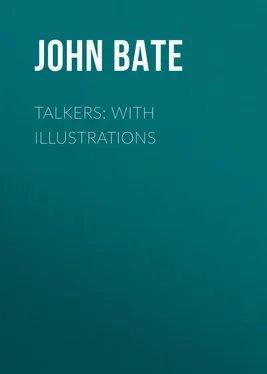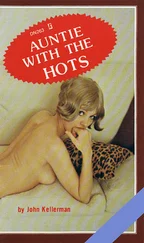John Bate - Talkers - With Illustrations
Здесь есть возможность читать онлайн «John Bate - Talkers - With Illustrations» — ознакомительный отрывок электронной книги совершенно бесплатно, а после прочтения отрывка купить полную версию. В некоторых случаях можно слушать аудио, скачать через торрент в формате fb2 и присутствует краткое содержание. Жанр: foreign_antique, foreign_prose, на английском языке. Описание произведения, (предисловие) а так же отзывы посетителей доступны на портале библиотеки ЛибКат.
- Название:Talkers: With Illustrations
- Автор:
- Жанр:
- Год:неизвестен
- ISBN:нет данных
- Рейтинг книги:5 / 5. Голосов: 1
-
Избранное:Добавить в избранное
- Отзывы:
-
Ваша оценка:
- 100
- 1
- 2
- 3
- 4
- 5
Talkers: With Illustrations: краткое содержание, описание и аннотация
Предлагаем к чтению аннотацию, описание, краткое содержание или предисловие (зависит от того, что написал сам автор книги «Talkers: With Illustrations»). Если вы не нашли необходимую информацию о книге — напишите в комментариях, мы постараемся отыскать её.
Talkers: With Illustrations — читать онлайн ознакомительный отрывок
Ниже представлен текст книги, разбитый по страницам. Система сохранения места последней прочитанной страницы, позволяет с удобством читать онлайн бесплатно книгу «Talkers: With Illustrations», без необходимости каждый раз заново искать на чём Вы остановились. Поставьте закладку, и сможете в любой момент перейти на страницу, на которой закончили чтение.
Интервал:
Закладка:
Sister Hopkins had so habituated herself to this way of speaking, that it was difficult for her to avoid it. As a housewife she was unexceptionable. She was careful to have everything in the most cleanly and orderly condition. She was an excellent cook, and the Squire an excellent provider, so that their table was always well spread, whenever good cheer was required. And yet you could not enter the house without being reminded that her “husband had company yesterday, and she could not keep the rooms half so decent as she would like;” and when you sat down to her table, covered with the best provisions, prepared in the best style of the cookery art, she was sorry that she “had so little, and so badly cooked.” She had been doing this or that, busy here or there, that she “really had not such things as she would have liked to have had, and you must excuse it this time.” It did not signify how bountiful or well-prepared the meal was, there was always sure to be something wanting which would be a text for a short sermon on self-disparagement.
On one occasion a minister was at breakfast when the table was well stocked with everything which could be desired – coffee of the finest flavour, tea of the richest kind, cream and butter fresh from the dairy, chickens swimming in gravy, with various kinds of preserves, and other things of a spicy and confectionery sort. No sooner had her guest begun to partake of her hospitality than Mrs. Hopkins commenced. She was afraid the coffee was not so good as it might have been, the cream and butter were not so fresh as she should have liked them, the chickens were hardly roasted enough, and as for the preserves, they had been boiled too much, through the carelessness of Mary, the servant. She meant to have had something better for breakfast, but had been disappointed; and it was too bad that there was nothing nice for him to eat.
All this was very heavy for her guest to bear. He simply remarked that “there was no need for apologies; everything was very good, and there was plenty of it.”
We will now introduce another person to the reader in connection with Mrs. Hopkins. It is Superintendent Robson, who had just come on the circuit. He was a good man, plain, homely, practical. Like Mr. Wesley, he no more dare preach a fine sermon than wear a fine coat. Such was the action of his religion upon his conscience. He was well known for his common-sense way of teaching the truths of the Bible. He would speak just as he thought and as he felt, although he might offend Miss Precision and Mr. Itchingear. He gained the name of being an eccentric preacher, as most preachers do who never prevaricate and always speak as they think. The failing of Sister Hopkins had reached the ears of Superintendent Robson. He had no patience with such a failing, and he was resolved to cure her. On his first visit to the village to preach, he stopped, according to custom, at Squire Hopkins’s. Thomas, the ostler, took the preacher’s horse, and the preacher entered the house. He was shown into the best room, and from all appearances felt quite at home. Everything was in perfect order and cleanliness, fit for the reception of a prince. The preacher had not been seated long, scarcely long enough to pass the usual interchange of first salutations and enquiries, when Mrs. Hopkins began in her old style to say she was “sorry that things were so untidy; her house was upside down; she was mortified to be found in such a plight; she really hoped before his arrival to have had all things in such order as she always liked to see them. She hoped he would excuse their being so.” Superintendent Robson looked around and about the room in all directions, to find out the terrible confusion to which his hostess alluded; but he said not a word. Shortly after the dinner was announced as ready; and as this was the first visit of the preacher, particular attention had been given to have a table spread with more than usual good things. The preacher, however, found from the Squire’s wife that there was hardly anything for dinner, and what there was she was ashamed for him to sit down to. The Superintendent heard her in mute astonishment. He lifted his dark eyes, and looking her in the face with penetration and austerity, he rose gently from the table and said, —
“Brother Hopkins, I want my horse immediately; I must leave this house.”
“Why, Brother Robson, what is the matter?”
“Enough the matter! Why, sir, your house isn’t fit to stay in, and you haven’t anything fit to eat or drink, and I won’t stay.”
The preacher mounted his horse and took his departure.
Both the Squire and his lady were confounded at such unexpected conduct. They stood in their room as though thunderstruck, not knowing what to say or what to do. But the preacher was gone, and could not be re-called.
After a few moments poor Sister Hopkins wept like a child. “Dear me,” said she to the Squire, “this is a terrible thing. It will be all over the village, and everybody will be laughing at me. How shall I meet the Superintendent again? I did not mean anything by what I said; it is only my way. I never thought it wrong. Had I known our new minister didn’t like such a way of talk I would not have talked so. Oh, how vexed I am!”
The result of this was that Mrs. Hopkins saw herself as others saw her. She ceased making these empty and meaningless apologies, and became a wiser and better woman. The next time Superintendent Robson went to the Squire’s he found a “house fit for him to stay in and things fit for him to eat.”
VIII.
THE COMMON SWEARER
“Take not His name, who made thy tongue, in vain,
It gets thee nothing, and hath no excuse.”
He is a transgressor of the third commandment of the Decalogue, “Thou shalt not take the name of the Lord thy God in vain.” He transgresses without any laudable purpose, and without any necessity. He is thoughtless, foolish, and void of the fear of God. “His mouth,” as an old divine says, “is black with oaths, and the very soot of hell hangs about his lips.” He degrades the most excellent things into the meanest associations. Sometimes he indulges to such an extent in his sin, that the main substance of his speech is swearing. It is more than an adjunct or concomitant of his conversation; it is the body and soul of it. Sometimes you may hear him, with an air of self-complacency, give utterance to his profanity, as though he regarded it an ornament of rhetoric, giving spice and condiment to his thoughts. There are occasions when he considers his talk only reliable in its truthfulness as this evil accompanies it. He would not be a man in his own judgment if he did not swear. He thinks he magnifies his own importance in the estimation of other people; but, alas! he promotes his own shame and disgrace before the eyes of the wise and good.
The common swearer is confined to no rank or age in society. I have heard the youth who was barely in his teens indulge in this sin, as though it had been a part of his parental or day-school education. I have heard the young gentleman, so-called, recently returned from the walks of a University, pollute his lips and character with this shameful vice. I have heard the man who laid claim to wealth, to intelligence, to respectability, and to honour, pour forth his swearing words. I have heard the man who has stood in official relation to the state, and who considered himself a “justice of the peace,” break the holy commandment with impunity. I have even heard one, called by the misnomer, “lady,” do disgrace to her sex by this sinful fault in conversation. In the household, with a group of little ones whose minds were just unfolding to receive first impressions, I have heard the parents swear as though they were licensed to do so by reason. In company, where common civility ought to have restrained, I have heard the utterances of the swearer’s horrid voice. In the street, where public decency ought to have deterred, I have again and again heard the revolting expressions of this talker’s leprous tongue. In the shop, while transacting business, I have heard him give vent to his blasphemies, when a kind reproof has only seemed for the time to enrage his demoniacal spirit to more fiery ebullitions. How humiliating is this sin to human nature! How it severs from everything that is holy and honourable! How it insults and blasphemes the glorious Lord of earth and heaven! How closely it allies to “the prince of the power of the air”!
Читать дальшеИнтервал:
Закладка:
Похожие книги на «Talkers: With Illustrations»
Представляем Вашему вниманию похожие книги на «Talkers: With Illustrations» списком для выбора. Мы отобрали схожую по названию и смыслу литературу в надежде предоставить читателям больше вариантов отыскать новые, интересные, ещё непрочитанные произведения.
Обсуждение, отзывы о книге «Talkers: With Illustrations» и просто собственные мнения читателей. Оставьте ваши комментарии, напишите, что Вы думаете о произведении, его смысле или главных героях. Укажите что конкретно понравилось, а что нет, и почему Вы так считаете.












